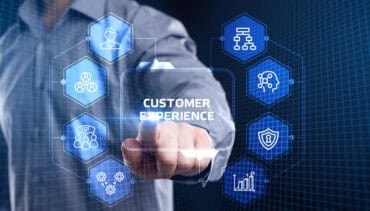
Integrating GenAI in data analytics and empowering citizen developers will help organizations experience the full potential of their data.
Generative AI (GenAI) is revolutionizing data analytics by going beyond mere predictions to giving us the tools to mimic human reasoning. Traditional AI models typically focus on predicting outcomes based on existing data patterns. GenAI allows us to go a step further and merge AI models that increasingly hold an extensive repository of human knowledge with proprietary organizational information such as financial data, customer preferences, and innovative product offerings.
This fusion opens up new venues for organizations to extract insights from vast, nuanced, and complex datasets. This shift has profound implications for customers aiming to unleash the full potential of their data.
Understanding the Shift: From Predictions to Insights
Year after year, CIOs spend more money on technology and analytics in an effort to make their companies work smarter. Thus far, traditional AI models have played a significant role in data analytics by predicting outcomes based on historical data. These models have useful applications, from customer behavior forecasting to supply chain optimization. However, only one-third of CEOs think they are getting value from these data-driven efforts. The limitation lies in the surface-level nature of the data and patterns they’re tracking—causing them to not fully grasp the underlying data structures.
GenAI offers companies the ability to make the shift from looking backward to looking forward. By diving deeper into the data, GenAI can uncover nuances that allow businesses to act based on previously unseen insights. For instance, it can reveal customer behavior patterns that were previously unnoticed, identify supply chain inefficiencies, and even predict future market trends.
This evolution is turning traditional business structures on their heads, transforming how companies derive value from the troves of data within their enterprise and offering a more holistic and profound understanding of data overall.
Finding Value in Applying GenAI
Integrating GenAI into data analytics is not just about optimizing processes for the present; it’s about building better analytics to inform business decision-making in the future. While much of the current emphasis of GenAI is on automating tasks or generating real-time analytics, GenAI offers additional value when used to improve how teams interact with data – supporting and elevating daily functions, including:
- Improved Reasoning and Planning: As businesses aim to navigate complex and dynamic environments, GenAI can create multiple scenarios so teams can visualize outcomes and plan accordingly. This ability to reason over data and generate insights will be key to inform strategic decisions across risk assessment and contingency planning.
- Automating Complex Processes: AI relies on a steady stream of accurate data, but extracting this data takes time. GenAI can automate the processes of pulling from multiple sources like data lakes and warehouses and multi-cloud set-ups to create helpful metadata, visualizations, and more. With these intricacies covered, businesses can let their data processes run in the background while they focus on higher-value activities.
- Creating Self-Adapting Practices: With a never-ending stream of data coming in, GenAI’s ability to adapt and refine models based on feedback will allow businesses to improve continuously. Over time, GenAI can be used to help develop best practices that are self-learning and self-adapting.
An Evolving Role for Data Scientists
As GenAI becomes more prevalent, the role of data scientists must evolve to keep pace with the growing demand for AI expertise.
While AI can automate many tasks, data scientists will continue to play a critical role in preparing data, selecting appropriate models, and ensuring the ethical use of AI throughout their organizations. GenAI is revolutionizing developer productivity through automation, allowing practitioners to channel their expertise into more high-value work. By handling the more mundane aspects of coding, AI tools are not only increasing efficiency but enhancing job satisfaction as developers engaged with more challenging and creative aspects of software development.
Data scientists will need to act as “data whisperers” and focus on honing essential skills that will help them succeed in this new landscape. It’s easy to crunch numbers, but human reasoning will be increasingly vital to contextualize data findings for business partners and stakeholders and policy awareness to ensure the ethical use of data for applications like large language models (LLMs).
Despite GenAI’s potential to transform industries, we are facing a projected global shortage of more than 85 million software engineers by 2030, whose skills will help navigate this changing landscape. In response, companies are increasingly turning to citizen developers – non-technical staff who can develop business applications using low-code/no-code platforms. This trend is gaining momentum: Gartner predicts that by 2026, developers outside formal IT departments will account for at least 80% of the user base for low-code development tools.
Citizen developers are not just a response to the IT talent gap, and they are a beacon of hope. They are empowered to bridge the gap by creating applications that meet business needs without requiring extensive coding knowledge – alleviating pressure on overstretched IT departments and enabling a brighter, more innovative future.
Supporting Citizen Developers
Companies need to go beyond recognizing the potential of citizen developers and ultimately commit to supporting their growth. Low-code/no-code platforms make it easier for citizen developers to bring their ideas to life. They provide intuitive interfaces, pre-built templates, and drag-and-drop functionalities that enable non-technical staff to develop robust business applications.
Empowering citizen developers also helps businesses overcome the IT skills shortage and drive digital transformation. This approach accelerates the development of new applications and fosters a culture of innovation where any employee can contribute to technological advancements. For any business looking to tap into deeper insights from their proprietary data, now would be a great time to open up the sandbox and welcome team members from outside the IT department.
As we look to the future, integrating GenAI in data analytics and empowering citizen developers will help organizations experience the full potential of their data – while paving the way for more innovative, efficient, and inclusive technological progress.






























